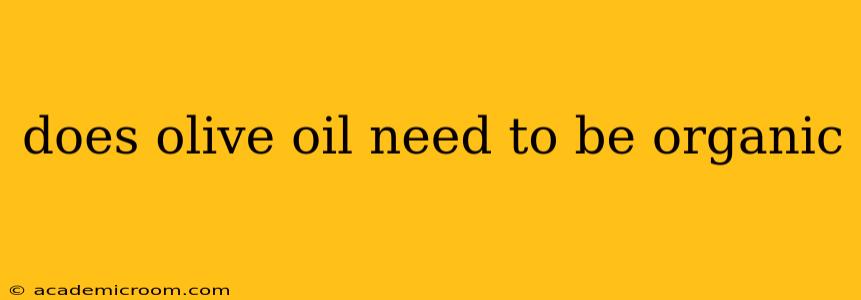Does Olive Oil Need to Be Organic? A Deep Dive into the Debate
The question of whether olive oil needs to be organic is a complex one, sparking debate among consumers, producers, and experts alike. The answer isn't a simple yes or no, but rather a nuanced exploration of factors influencing your choice. This comprehensive guide will delve into the key considerations, helping you make an informed decision based on your priorities and preferences.
What Does "Organic" Mean for Olive Oil?
Before we delve into whether it's necessary, let's define what "organic" signifies in the context of olive oil. Organic olive oil is produced following strict guidelines that prohibit the use of synthetic pesticides, herbicides, fertilizers, and genetically modified organisms (GMOs) throughout the entire growing process. This extends from the olive grove management to the oil extraction process. Certification bodies, like the USDA Organic in the United States or the EU Organic label in Europe, verify compliance with these regulations.
Is Organic Olive Oil Healthier?
This is a frequently asked question, and the answer is not definitively proven. While organic farming practices aim to minimize environmental impact and reduce exposure to potentially harmful chemicals, scientific studies haven't consistently demonstrated that organic olive oil is significantly more nutritious or healthier than conventionally produced olive oil. Both types can offer a wealth of health benefits associated with their high monounsaturated fat content, antioxidants, and anti-inflammatory properties. The difference often lies in subtle variations in the levels of these beneficial compounds, which can vary depending on factors like olive variety, climate, and harvesting methods, not just organic status.
Does Organic Olive Oil Taste Better?
Taste is subjective, and many individuals perceive a difference in the flavor profile between organic and conventionally produced olive oil. Some believe that organic olive oils possess a more intense, fruity flavor with nuanced aromas, while others find no noticeable difference. This perception can be influenced by a multitude of factors including the olive variety, processing techniques, and even personal taste preferences. The absence of chemical residues might influence the taste experience for some.
Are There Environmental Benefits to Choosing Organic Olive Oil?
Choosing organic olive oil does indeed support more sustainable agricultural practices. Organic farming methods emphasize biodiversity, soil health, and reduced environmental impact compared to conventional farming, which often relies on synthetic inputs. By purchasing organic olive oil, you contribute to a system that prioritizes ecological balance and reduces the risk of soil degradation and water contamination.
What are the Main Differences Between Organic and Non-Organic Olive Oil?
The most significant difference lies in the farming methods employed. Organic olive oil production adheres to strict guidelines prohibiting synthetic pesticides, herbicides, and fertilizers. This approach reduces the environmental impact but may lead to higher production costs. Conventionally produced olive oil doesn't have these limitations, often resulting in lower prices. However, responsible conventional producers are increasingly adopting sustainable practices that minimize environmental harm.
How Can I Tell if Olive Oil is Truly Organic?
Look for certification seals from reputable organizations. These seals guarantee the olive oil meets specific organic standards. In the US, this is the USDA Organic seal; in Europe, it's the EU organic logo. Always carefully inspect the label to verify its authenticity.
Is the Higher Price of Organic Olive Oil Justified?
The higher price reflects the additional costs associated with organic farming practices. These costs include the higher labor intensity, the reliance on natural pest control, and the stricter regulations surrounding certification. Whether the higher price is "justified" depends on your individual priorities and willingness to pay a premium for organically produced goods. Consider the environmental and ethical implications alongside the potential taste and health benefits when making your decision.
Ultimately, the decision of whether or not to buy organic olive oil is a personal one. Consider your priorities: are you primarily concerned with health benefits, environmental impact, taste preferences, or cost? By weighing these factors, you can make a choice that aligns with your values and lifestyle.
